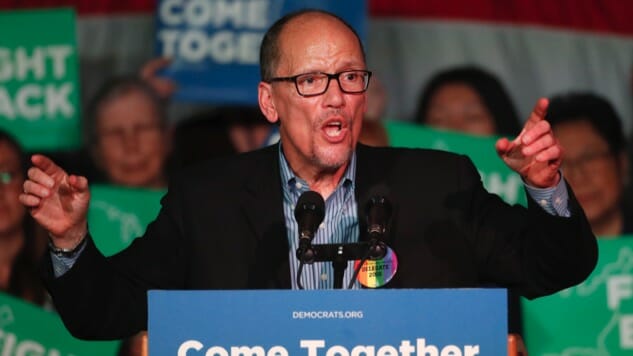The #Resistance Party Can’t Stop Shooting Itself in the Foot
Photo by Sean Rayford
My home state of North Carolina is ground zero for a lot of things: national elections, Tea Party experiments, anti-LGBTQ discrimination, gerrymandering and voter suppression, to name a few. It’s also known for being host to some of the most important civil rights struggles in history, such as the 1960s sit-in movement and the recent Moral Mondays led by Rev. Dr. William Barber. Despite how it may seem today, North Carolina truly is a purple state.
The Tar Heel State went for Barack Obama in 2008, and until 2010, Democrats had controlled the government for decades. As of today, 39% of registered voters in the state are Democrats, 30 percent are Republican, 30 percent are unaffiliated and 0.5 percent are Libertarian. Yes, a state with Republican supermajorities in both legislative chambers, 10 Republican U.S. representatives out of its total 13, and both U.S. senators from the GOP actually has significantly more registered Democrats than Republicans. I won’t go too far into the disastrous racial gerrymandering that the state legislature enacted in 2011, but here’s a good explainer at Facing South. In short, Republicans, in coordination with a national super PAC, drew maps that packed black voters into a small number of districts, diluting their voting power in the surrounding districts. Numerous courts have struck down these districts as racial gerrymanders, but several cases are still in the appeals process.
In the month before last year’s general election, North Carolina was hit with a devastating hurricane that killed at least 26 of its residents and thousands of livestock, cut power to a million homes, closed more than 600 roads and inflicted severe environmental damage. In November, 50.5% of North Carolina voters cast their ballots for Donald Trump. His opponent Hillary Clinton lost by less than 4 percent. Meanwhile, voters ousted their unpopular GOP governor, Pat McCrory, replacing him with a Democrat who campaigned against the discriminatory bathroom bill and voting restrictions that McCrory and his party championed.
In May, the Trump administration denied North Carolina 99% of the funding it requested to continue fixing the damage from Hurricane Matthew. In response, Gov. Roy Cooper said in a letter to the Trump administration, “I…invite you to visit North Carolina and see the devastating impacts of this disaster first hand. Our citizens and communities are struggling, and will only be able to make a full recovery with the aid of much needed federal assistance.”
Six months after the election, the founder of a popular liberal website that also raises money for Democratic candidates thinks it’s fine to demean people who happen to live in a state that gave its electoral college votes to Trump. On May 11, after the Trump administration denied North Carolina’s funding request, Daily Kos founder and publisher Markos Moulitsas tweeted, “There’s your reward for voting Republican, North Carolina.”
-

-

-

-

-

-

-

-

-

-

-

-

-

-

-

-

-

-

-

-

-

-

-

-

-

-

-

-

-

-

-

-

-

-

-

-

-

-

-

-








































